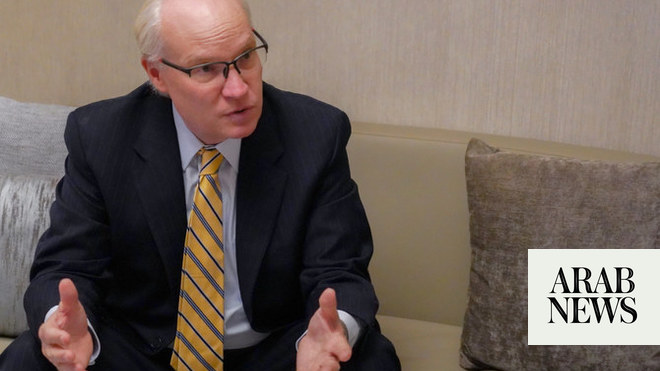
Despite the challenges facing Yemen, Feierstein remains optimistic that a deal to end the war is still possible
AL-MUKALLA: A return to negotiations to establish a peaceful resolution to years of conflict in Yemen is “unlikely” in the near future due to the current escalation in fighting, Gerald Michael Feierstein, the US envoy to Yemen from 2010 to 2013, told Arab News on Wednesday.
The Houthis’ drone and missile attacks on a military training site that killed 110 soldiers in Marib in January and subsequent offensives in Jawf, Sanaa, Nehim and Marin have killed hopes for peace in the war-torn country, Feierstein believes.
“It’s difficult to understand the Houthi strategy. Initially, I thought they were trying to improve their position on the ground in anticipation of a return to the negotiating table,” he said.
“Now, it appears that at least some factions within the Houthi movement are once again seeking a military victory or, at least, to secure complete control in the north.”
Feierstein, the current vice president of the Middle East Institute, a US-based think tank that promotes understanding between the US and Middle East countries, was one of many commentators who believed the country was inching toward peace last year when fighting subsided, airstrikes dropped nearly 80 percent, and Saudi Arabia brokered a deal that ended tension in Aden.
“I was one of the people who thought the signs in December were favorable for progress on a political settlement. Needless to say, I have been disappointed that those positive signs have not resulted in progress on the ground and the situation seems to have become much more complicated,” he said.
Stockholm Agreement
Many Yemeni government officials argue that the Stockholm Agreement that halted fighting in Hodeidah led to a release of military pressure on the Houthis, which enabled them to mobilize forces on other battlefields.
But Feierstein believes the Yemeni government was right to sign the deal despite the Houthis’ reluctance to implement it.
“I don’t think that the government was wrong to seek a negotiated outcome to the situation around Hodeida or to agree to steps that would ease the suffering of millions of Yemenis, reducing pressure around Taiz, and freeing prisoners,” he said, adding that a military offensive in Hodeidah was likely to cause a disaster.
“They were right to test Houthi willingness to move in a positive direction. At the very least, the potential for a tragic outcome of a fight for Hodeida was very real. It’s unfortunate that the Houthis did not fulfill their commitments to the agreement.”
Secession as a solution
The partition of Yemen — the main demand of hard-line factions in southern Yemen — would only complicate the situation in the country, Feierstein argues.
“I have always been clear that I believe secession would be a wrong step for Yemen,” he said. “First, there’s no reason to believe that Yemenis would agree to return to the two states that existed pre-1990; second, I don’t believe that a divided Yemen would offer greater security, political, or economic stability to the Yemeni people than a united Yemen could offer.”
The former ambassador’s third reason for rejecting partition is that he believes a federal system that grants regions the right to self-rule would be preferable. “I believe a united Yemen, with a federal structure and significant local autonomy, could address the grievances that many Yemenis express,” he said.
Feierstein blasted those who speak fondly of the former president’s rule and those who push to empower his relatives and loyalists. “The root causes of the current conflict can be found in the record of Ali Abdullah Saleh’s rule,” he said. “Yemenis have struggled to turn the page on the Saleh era, which was marked by widespread corruption and crony capitalism, broad political disenfranchisement, and economic marginalization for millions of Yemeni citizens. A return to where Yemen started — after so many years and so much sacrifice — would be a tragedy, in my view.”
Weakened Al-Qaeda
Feierstein was in Sanaa when Al-Qaeda militants seized control of key towns in the southern province of Abyan in 2011, and oversaw US military aid to the Yemeni army, who later pushed militants out of their strongholds.
Those same militants have struggled to exploit the lawlessness in some areas of Yemen to regain a toehold, something Feierstein says is down to a lack of grassroots support. “I believe that Al-Qaeda initially believed it would be able to expand as a result of the anti-Saleh movement, the security collapse and the beginning of the civil war,” he says. “But Yemenis are not extremists. Most Yemenis are not attracted to Al-Qaeda’s vision. Therefore, Al-Qaeda has largely failed in its efforts to deepen its roots in Yemen.”
And Feierstein does not agree with the government’s repeated demand to designate the Houthis as a terrorist organization. “It’s clear from popular attitudes toward the Houthi movement that most Yemenis disagree with their strategy, their tactics, and their vision,” he says. “But that’s different than being a terrorist organization. The Houthis need to be defeated as an anti-Yemeni movement.”
Feierstein also stressed that Iranian involvement in Yemen has been a factor long before the Houthi takeover of Sanaa in late 2014. “It’s clear that the Iranians saw the Houthi movement as an opportunity to put pressure on Saudi Arabia and to threaten its southern border. It’s unfortunate that Yemen has become the victim of Iranian-Saudi competition,” he said.
Despite the challenges facing Yemen, Feierstein remains optimistic that a deal to end the war is still possible.
“All civil wars end. The only question is how long it will take and at what cost,” he said. “The price the Yemeni people have already paid is enormous. One hopes that a way can be found to bring this conflict to an end.”












